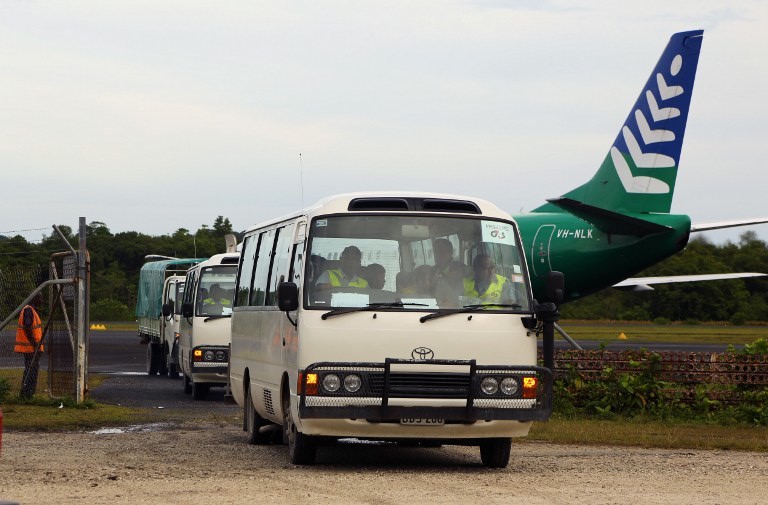SUMMARY
This is AI generated summarization, which may have errors. For context, always refer to the full article.

SYDNEY, Australia – The first asylum-seekers to be sent to Papua New Guinea under Australia’s new hardline refugee policy arrived in the impoverished Pacific nation Thursday, August 1, with Canberra declaring people-smugglers no longer had a product to sell.
Their arrival formally brought into effect a bilateral agreement reached last month that asylum-seekers arriving in Australia on unauthorized boats will be sent to PNG for processing and resettled there — even if judged to be genuine refugees.
The 40 asylum-seekers, mainly Iranian and Afghan men, were flown from Australia’s Indian Ocean territory of Christmas Island Wednesday night (July 31), accompanied by Australian police and medical staff, the immigration department said.
Immigration Minister Tony Burke said it showed Canberra was serious about not resettling boatpeople in Australia.
“Over time, every single person who arrives under these new rules will find the government is true to its word,” he said.
“As of now there are the first 40 people in Papua New Guinea who are realizing that the people-smugglers no longer have a product to sell.
“The promise of living and working in Australia, which is sold by people-smugglers before they push people onto the high seas, is no longer a product available.”
Asylum-seekers are a sensitive issue in Australia, and one featuring prominently in the lead-up to national elections due this year, which will pit the Kevin Rudd-led Labor government against the conservative opposition headed by Tony Abbott.
Both are promising a harsh stance, with Abbott unveiling rival plans for a military-led operation and detention for arrivals in a tent city on far-flung Nauru.
Despite the tough talk, more than 1,400 asylum-seekers have arrived on 18 boats since the government announced its new stance. Australia’s Manus Island facility in PNG is currently only able to accommodate 500, although there are plans to expand it to cater for at least 3,000.
Burke said: “In the coming days there will be more and more flown across” to PNG, with an advertising campaign spelling out the policy in key transit countries like Indonesia and Sri Lanka to be stepped up.
Rights groups have criticized the state of existing facilities at Manus Island, with the United Nations last week saying it was “troubled” by the decision to send asylum-seekers there.
The UNHCR highlighted “significant shortcomings” in the legal framework for receiving and processing asylum-seekers.
“These include a lack of national capacity and expertise in processing, and poor physical conditions within open-ended, mandatory and arbitrary detention settings,” it said.
Australia resumed sending asylum-seekers offshore to Manus Island and the Pacific state of Nauru in 2012 in a bid to deter record numbers of asylum-seekers arriving by boat. Hundreds have drowned making the perilous journey in recent years.
But under the new arrangement they will not only be processed in PNG, but permanently resettled there if found to be genuine refugees.
The first transfer comes as PNG Prime Minister Peter O’Neill outlined the costs of major projects Australia has agreed to fund as part of the deal.
In an interview with The Australian newspaper, he said the total cost would be around Aus$787 million (US$705 million), with Australia contributing about Aus$489 million.
This includes the rebuilding of a hospital and renovation of PNG’s universities, which will be jointly funded, and the construction of a key highway between Lae and Madang and a new court building in the capital Port Moresby that Canberra will solely fund.
O’Neill said his country had agreed to help because Australia was “our best friend” and “we are a Christian nation”.
“Our Christianity surely requires we exercise compassion — and exercising compassion surely means discouraging the evil practice of people-smuggling,” said O’Neill. – Rappler.com
Add a comment
How does this make you feel?
There are no comments yet. Add your comment to start the conversation.